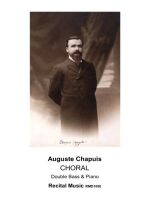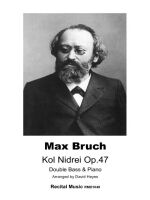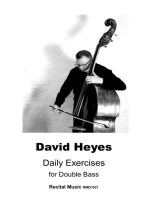Darby and Joan
Intermezzo Romance

Violin, Double Bass & Piano
Composer: Adolf Lotter
Product code:
RMD1199
Publisher: Recital Music
£8.50
Description
Darby and Joan has been long out of print until Recital Music’s printed edition in 2000 and is a novelty intermezzo in the romantic salon style of the early part of the 20th century. The music is lyrical and melodic, with few technical challenges for the good intermediate player, and successfully partners the highest and lowest members of the string family. In one movement and full of lively music, this would be ideal for anyone who enjoyed playing Lotter’s The Ragtime Bass Player.
Interestingly Lotter calls it an ‘Intermezzo Romance for Solo Double Bass, Solo Violin and Piano’, but the parts seem to be matched equally and neither the double bass nor the violin is more important than the other. He also suggests that Darby and Joan can also be played by cello and violin or bassoon and flute.
Darby and Joan was first published in 1939 by Melodeon, the composer’s own company, and exists in versions with piano or string orchestra accompaniment. The original edition includes his address (147 Golders Green Road, London N.W.11) which is now a hotel (http://goldersgreenhotel.co.uk/).
Double Bass is in orchestral tuning.
Look Inside
Description
Darby and Joan has been long out of print until Recital Music’s printed edition in 2000 and is a novelty intermezzo in the romantic salon style of the early part of the 20th century. The music is lyrical and melodic, with few technical challenges for the good intermediate player, and successfully partners the highest and lowest members of the string family. In one movement and full of lively music, this would be ideal for anyone who enjoyed playing Lotter’s The Ragtime Bass Player.
Interestingly Lotter calls it an ‘Intermezzo Romance for Solo Double Bass, Solo Violin and Piano’, but the parts seem to be matched equally and neither the double bass nor the violin is more important than the other. He also suggests that Darby and Joan can also be played by cello and violin or bassoon and flute.
Darby and Joan was first published in 1939 by Melodeon, the composer’s own company, and exists in versions with piano or string orchestra accompaniment. The original edition includes his address (147 Golders Green Road, London N.W.11) which is now a hotel (http://goldersgreenhotel.co.uk/).
Double Bass is in orchestral tuning.



